Acer Aspire S7 Ultrabook: Acer’s Best Foot Forward
by Jarred Walton on January 7, 2013 4:30 AM EST- Posted in
- Laptops
- Acer
- Intel
- Ivy Bridge
- Aspire S7
- Ultraportable
- Ultrabook
Windows 8 Tablet Performance
As noted on the previous page, I’m going to run some of our hybrid laptops like the Aspire S7 through the tests we’re using on tablets. Much ado has been made about the performance of the latest ARM-based SoCs, and I think it’s good to put things in perspective. There are two major items of note: first is that battery life is quite a bit worse with Ivy Bridge compared to Atom and ARM SoCs; the second is that performance is nearly an order of magnitude faster in many tests.
For the tests below, note that I used the same Internet benchmark that we use for tablets, which is far less strenuous than our laptop Internet testing. In fact, the difference in battery life between our “webtest4d” and our idle battery life test is only a few minutes. Display brightness also seems to have a relatively minor impact on battery life with the S7, as it only gains an extra 5-20 minutes going from 200 nits to 100 nits brightness (depending on the test).
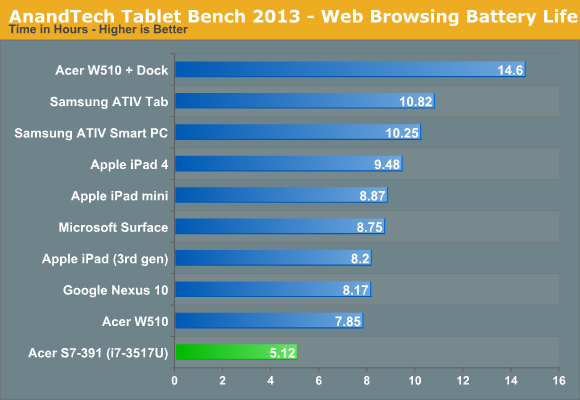
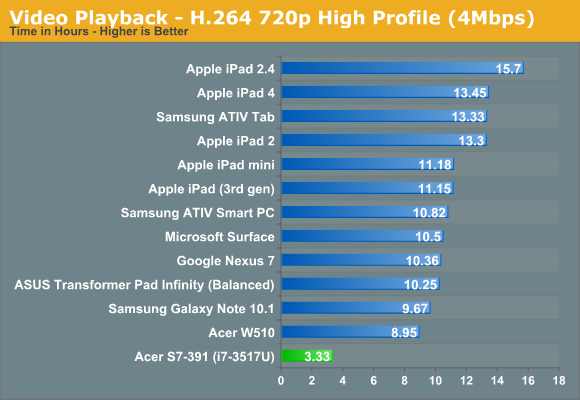
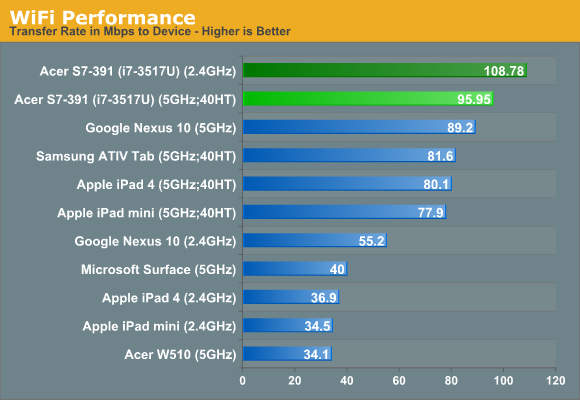
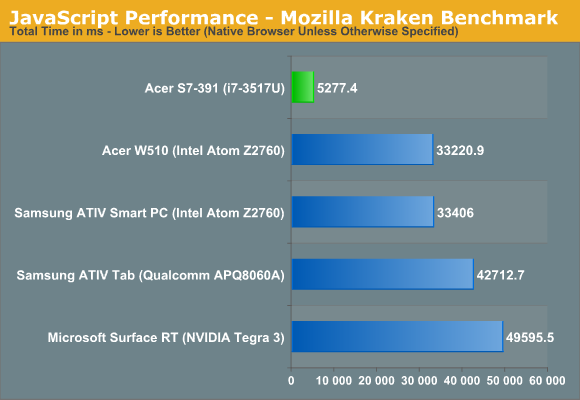
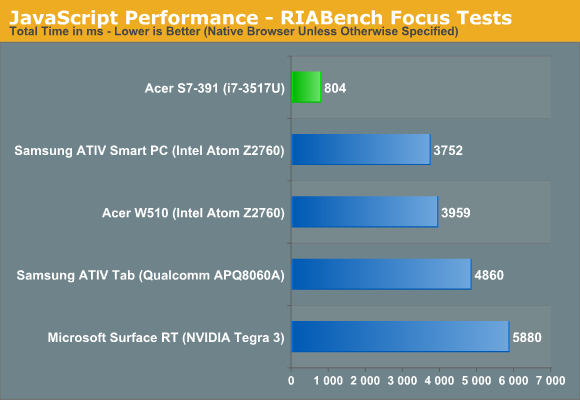
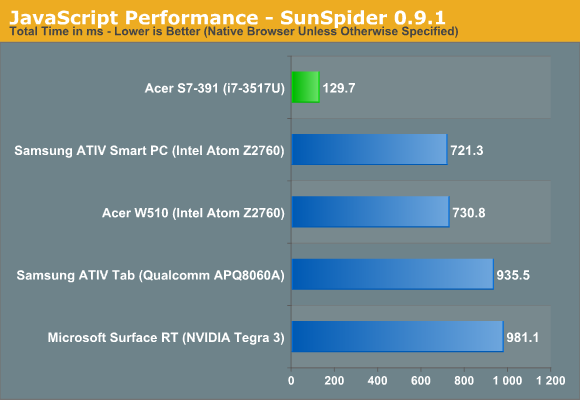
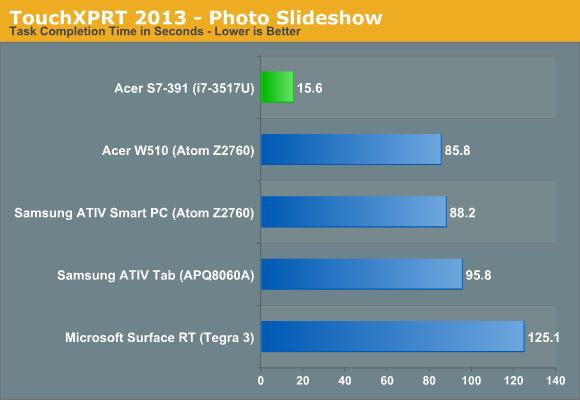
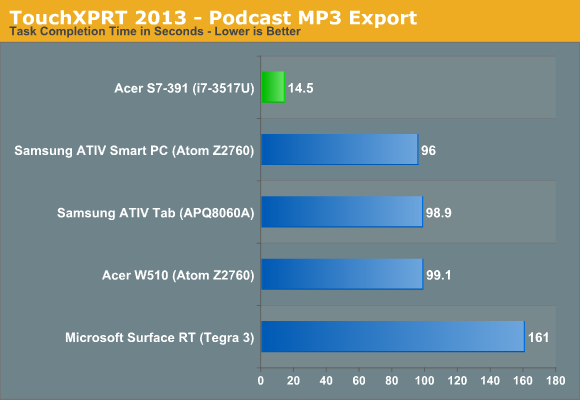
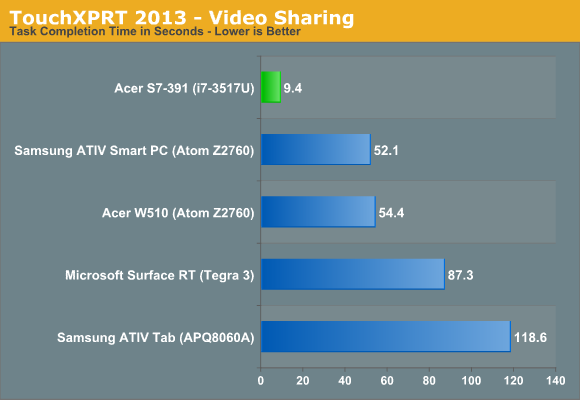
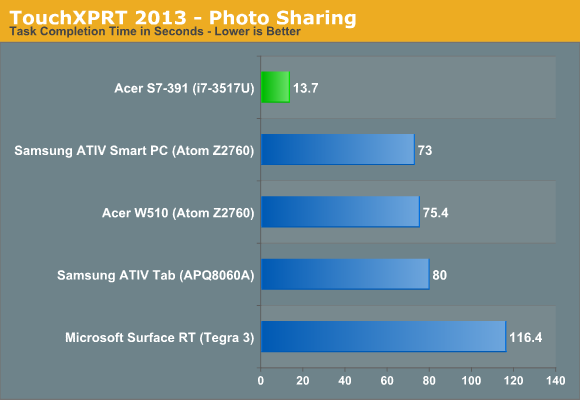
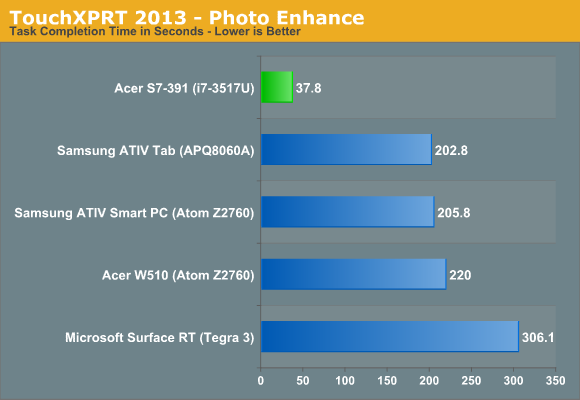
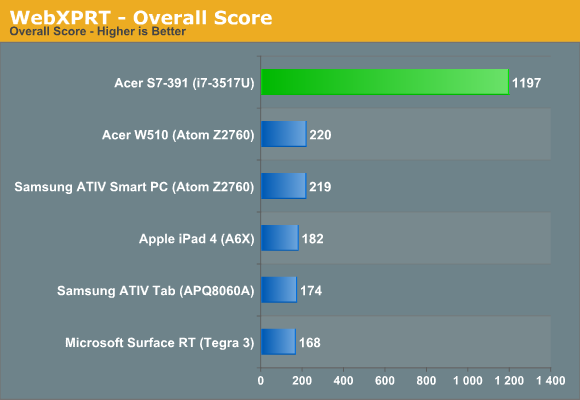
When people say that tablets are taking over for laptops, this is where we continue to fall short, and we’re not even talking about top-end laptop performance here. Bring in Haswell in the next few months and we might even see much of the battery life deficit disappear. Simply stated, ARM tablets will need much more than a doubling of performance to come anywhere near the performance level of Intel’s current ULV processors. Again, depending on what Intel manages with Haswell, it’s much more a question of whether tablets can become “fast enough” than whether they can actually catch Intel any time soon.
In terms of performance, the Aspire S7 is over 6x faster than the closest tablet in Kraken, 4.5x faster in RIABench, 5.5x faster in SunSpider, and basically 5.5x faster an all of the TouchXPRT/WebXPRT tests. In most tests, we’re looking at the Atom Z2760 as the runner up, but let’s focus on Tegra 3 just for a moment. There, Core i7-3517U is anywhere from 7-11x faster; Wayne needs to get here sooner rather than later.
It should go without saying that browsing in the Windows modern UI is smooth on the S7—though interestingly, while the touch screen interface scrolls nicely, using the touchpad to scroll around has some odd stuttering when you “coast”. Considering we have a laptop with four times as much RAM, a substantially faster SSD setup, and all that processing power, the Modern UI never appears to have a problem even on HD 4000. That’s going to make things a bit interesting for the folks at AMD and NVIDIA, depending on how the new UI and apps catch on. Then again, that new UI deserves some commentary.
Thoughts on the Windows 8 UI Experience
At best, I have serious concerns with Windows 8's new UI, at least from a laptop/desktop perspective. I said as much several months ago, and the final release has done virtually nothing to assuage my concerns. Using a touch screen to browse around works well enough, sure, but reaching across the keyboard to do so feels awkward at best. Then there’s the crazy switch between the Modern UI and the Classic Desktop UI, and the touch screen feels all but useless in the latter.
For tablets and smartphones, I think the Windows 8 UI makes tons of sense, but as soon as you slap a keyboard and touchpad in front of the user, it’s a different experience. Windows CE and earlier iterations of Windows Phone felt like Microsoft was trying to cram a full-blown desktop OS onto a handheld device without doing proper optimizations. Windows 8 feels like they’re now going the other way.
As for the Aspire S7, it does okay at straddling the line between the tablet and laptop worlds, but while I thought it was somewhat novel at first, when I got time with a Dell XPS 12 I really started to feel the faults with the S7 approach. Dell’s XPS 12 is much thicker, true, but even though the weight makes for a less than ideal tablet experience, it’s still a better tablet than the S7. Lenovo’s Yoga is another alternative, but I’m still iffy on the idea of having the keyboard exposed in tablet mode—I understand the keys all deactivate, but it just seems like a great way to get a lot of extra dirt into your keys over time. Acer has decided that instead of trying to make a true tablet-like experience, they would allow you to open the hinge 180 degrees and lay the S7 flat. I guess that can work, but in reality I almost never put a tablet flat on a table/desk; I hold it in my hands while I lounge on the couch, and the S7 doesn't feel natural in that environment.










53 Comments
View All Comments
mforce - Monday, January 7, 2013 - link
I find it seriously difficult to justify spending more than 500$ on a laptop. I don't make that much but even if I did ... I'm not really sure what justifies and over 1000 $ price for a laptop, it's just way too much.And the fact that it's an Acer doesn't help things much, let's face it, Acer doesn't really have a premium brand and it's not Apple. If I'll want to sell it right after I buy it I probably won't get more than 1000$ for it.
Besides even cheapo laptops often last quite a long time, I have an Acer I paid 400$ for and it's still running just fine 4 years later.
Romberry - Monday, January 7, 2013 - link
It's a conundrum eh? People like to complain that Windows-based notebooks aren't up to the build quality of Apple's MacBooks that go for well over a grand, but when confronted with a Windows-based notebook that rivals (or meets and in some cases exceeds) the build quality of Apple's MacBooks, the same crowd that bemoans the quality of the sub-500 dollar Windows machines balks.You can have cheap and (hopefully) acceptable, or you can have quality and the price that comes with it. If you're a 500 dollar and under laptop kind of person, then obviously this product is not for you.
Personally? I tend to agree that paying well over a grand for a laptop is very hard to justify for most people. I wouldn't do it. Example? I'm typing this post on an old (five years plus) Dell Inspiron e1505 running a Core Duo (not Core 2) processor , 1680x1050 display, 4 gigs of RAM and a 500 gig Hitachi hard drive with 32 bit Vista Ultimate. Bought two of these in May of 2007 for about 500 dollars a whack new from Dell on special, one for me and one for my daughter. Does everything I need it to do and is comfortable like an old shoe.
I have a Dell Latitude 6400 in the next room (Core 2 Duo P9600 at 2.66 GHz, 8 gigs RAM, 1920x1200 display, 128 gig Samsung 470 SSD primary drive, 500 gig WD Scorpio Black in the expansion bay in place of the optiical drive.) that I paid all of 400 dollars for off lease two years ago. (Added the SSD, upgraded the RAM and installed Win 7 x64.) It mostly sits unused because of the old shoe factor with the Inspiron.
Neither are sleek or easily portable, but they are functional, stable and reasonably fast for what I do with 'em.
I'm not sure just how big a market there is really for high end laptops. Apple sells a lot of MacBooks in terms of units, but in terms of overall market share...not that much. MacBooks are a niche. I think Winbooks built to these high standards are likely to be niche products as well, garnering about the same 3-5 percent share of the overall market as MacBooks. (Of course for many people I think those Apple MacBooks are as much a fashion accessory as they are a PC. Winbooks will likely never have that sort of purposeful snob appeal cachet. Then again, not everyone wants to be a snob.)
blue_urban_sky - Monday, January 7, 2013 - link
I agree with your statement about PC laptops not being able to win as they either feel cheap because they are or are too expensive. I would however like to draw some comparisonsGalaxy S3 ~ £400
iPad4 3g 64gb ~ £650
so £1000 for an ultra-book is not out of place, Don't get me wrong they are all expensive and products like the nexus range start to chalenge these premium prices.
Just so my bias is clear I own a S3, nexus 7 and brought my wife a yoga 13 for xmas as she is a dev and commutes with her laptop on the train so I wanted to find a nice light one. She loves it so money well spent.
mforce - Monday, January 7, 2013 - link
Sure but Nexus devices are cheaper and still quite good. And besides smartphones and tablets are all the rage these days , I don't think such a device can match that.Death666Angel - Monday, January 7, 2013 - link
200€ for a Nexus 7, 300-350€ for a Nexus 4, 400€ for a Nexus 10 and ~150-200€ for about any dual/quad A9 Chinese tablet and smartphone with specs similar to the current high end crop (800p, 1080p, 1200p ips screen @ tablet, 540p or 720p @ smartphone, 4-32GB NAND, 7.4Wh/25Wh batteries etc.). So I would argue that the prices you mention are just as overpriced.blue_urban_sky - Monday, January 7, 2013 - link
Although there is an argument that the high end products profits from manufacturers like Samsung, LG and Apple (tho indirectly) go toward the R&D of next gen hardware. I cannot see those same chinese manufacturers coming out with a flexible display until the tech is matured by one of the larger players at significant cost.Overpriced is strong term, as mentioned in the article the PC community have enjoyed a race to the bottom with little thought to anything other than Power/Price. I for one am glad that companies are looking to push toward aesthetics. If a Bugatti Veyron costs £2M, Aston Martin Vanquish costs £180k and Suzuki Alto costs £6k which one is better to get a pint of milk from the store in? and would you really like to live in a world where there is no "Wow"?
Death666Angel - Monday, January 7, 2013 - link
Then disregard the Chinese offerings, but a Nexus 7 at 200/250€, a Nexus 4 at 300/350€ and a Nexus 10 at 400€ still significantly undercut his listed devices while offering comparable to arguably better specs.As for the rest of your comment that car analogy has nothing to do with my comment and you are reading things into my comment that are clearly of your own mind.
blue_urban_sky - Tuesday, January 8, 2013 - link
The car comparison was just to illustrate that overpriced is highly subjective. The initial prices included the statement that the nexus range were challenging the sector, although google is not interested in profiting off these devices themselves.(http://crave.cnet.co.uk/mobiles/google-nexus-7-sel...
I would think that these ultrabooks are not big earners due to high development costs and low unit sales, So rather than overpriced I think that maybe they are just expensive.
mforce - Monday, January 7, 2013 - link
I was just saying that Acer can't expect people to pay as much for their brand as they do for Apple or Sony ( if you want Windows laptops ) and that's the reality. Given the choice almost anyone would choose an Apple or Sony product ... sure it may not be better and I know that but this is how it works.Also I find the touchscreen on a laptop a bit useless maybe, I don't find myself using it much. I'd rather have a mouse :D
blue_urban_sky - Monday, January 7, 2013 - link
Poor old Acer, If they are trying to up there game good on them I think they know it will be an uphill battle winning consumers over and maybe they have made a product that is very well made with quality parts for that very reason.... Maybe.